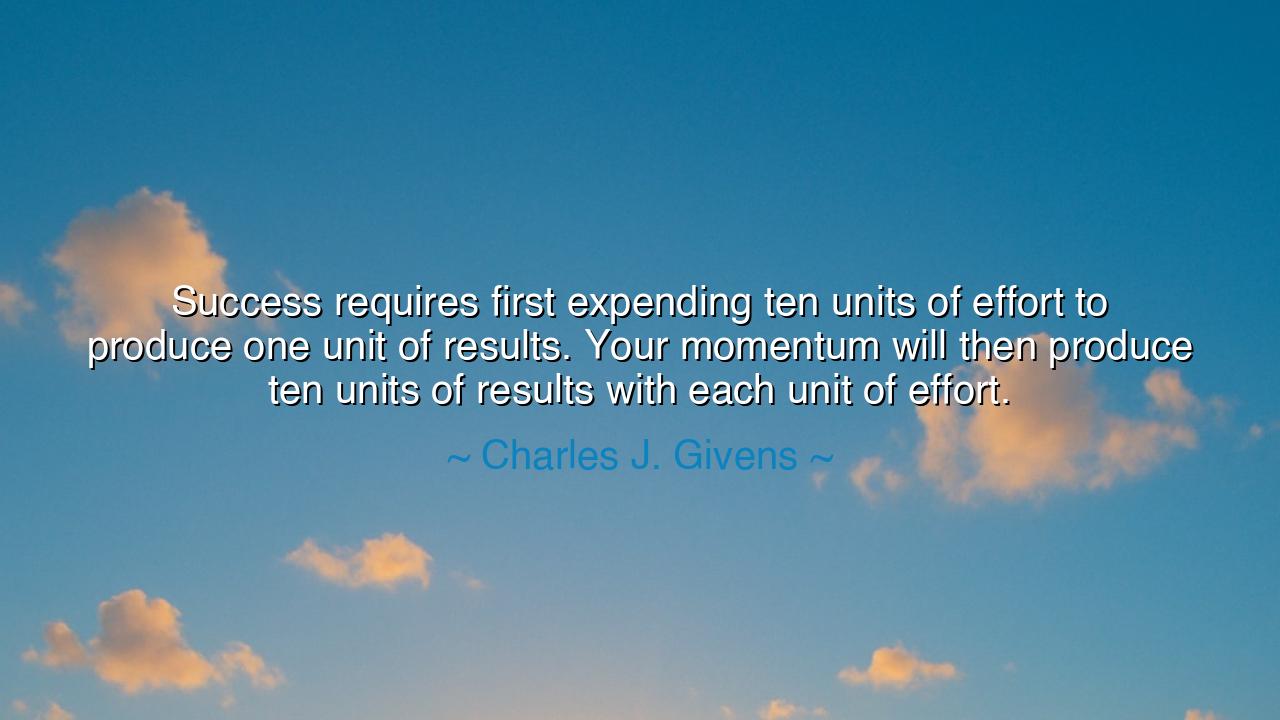
Success requires first expending ten units of effort to produce
Success requires first expending ten units of effort to produce one unit of results. Your momentum will then produce ten units of results with each unit of effort.






The financial teacher and motivational voice Charles J. Givens once declared with clarity: “Success requires first expending ten units of effort to produce one unit of results. Your momentum will then produce ten units of results with each unit of effort.” These words carry the essence of an ancient truth, that all greatness demands sacrifice at the beginning, and that only through perseverance does the balance of labor and reward shift in one’s favor. They are a reminder that success is not immediate, but born of endurance, discipline, and the patient building of momentum.
The first part of his wisdom speaks of the ten units of effort for one unit of results. This is the beginning of every journey, the hardest stage where the soil resists the plow, where the stone refuses to move, where the river will not yet bend. It is here that most falter, mistaking difficulty for failure. But Givens reminds us that this stage is natural—it is the price of beginnings. To create something from nothing is always costly. Like a spark struck from stone, it demands repeated blows before fire is born.
Yet then comes the miracle of momentum. Once the spark catches flame, it grows swiftly; once the wheel begins to turn, it turns more easily with each push. Momentum is the invisible ally of persistence, the power that multiplies results once effort has laid the foundation. Where once one unit of result required ten units of labor, now ten units of reward may spring from a single act. Momentum transforms drudgery into mastery, struggle into flow, and endurance into triumph.
History gives us countless examples. Think of Thomas Edison, who spent long nights testing thousands of filaments before a single lightbulb shone. His early efforts brought little result, yet he did not abandon his work. Once the invention succeeded, however, his momentum transformed him, carrying him into further discoveries and changing the world. At first, his labor outweighed his results; later, his results outpaced his labor. This is the very rhythm Givens described.
Or recall the story of Nelson Mandela, who endured decades of imprisonment with little visible progress toward freedom. His years of suffering were the ten units of effort for a single unit of hope. Yet when the time of change came, his moral momentum carried him forward, and with a single word or gesture he could sway millions. His patience transformed hardship into strength, and his momentum gave results far greater than any single action alone.
The lesson is clear: do not despair in the early stages of your struggle. When your labor seems great and your results small, know that you are laying the groundwork for momentum. Do not abandon your craft, your discipline, or your dream, for momentum is forged only through persistence. What seems heavy today will become light tomorrow, and what seems fruitless now will one day bear abundant harvest.
Practically, this means: commit to consistency. Take daily steps, even when progress seems invisible. Embrace the season of toil without immediate reward, for it is shaping the foundation of your future success. Seek small victories and let them build your momentum. Remember that momentum grows not in leaps but in steady, repeated effort, until suddenly the tide turns in your favor.
So let Givens’ wisdom be etched upon your heart: success demands much at first, but gives much more in return to those who endure. Endure the hard beginnings, and momentum will reward you. What once cost you tenfold will one day yield tenfold, and you will know that persistence, not ease, is the mother of triumph.






AAdministratorAdministrator
Welcome, honored guests. Please leave a comment, we will respond soon